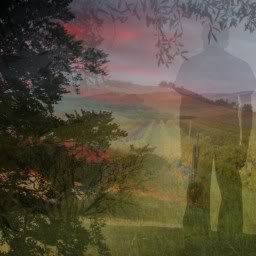A system has been developing. A method of survival. Rest while on guard. Sleep while the other keeps watch. Signals, silent taps warning each other. Gestures. Has it really been less than two weeks? Our time together has transformed us.
The city is far behind us, and we walk through endless expanses of agriculture. Hunger, persistent and dangerous, forces us to rediscover what can be eaten, and what not. Three days of debilitating stomach cramps had taught us to not eat unripe vegetables. It had been a painful lesson.
I look at Julia as we walk. Her youth is fleeing her. Her face is hardened, gaunt. Her eyes search the shadows, never still. Dangling at her hip by a strip of cloth is a baseball bat we’d cut down with tools from a shed. Now she carried just the hefty part. Her other hand held a pole, like a walking stick, with which she hoped to fend of zombies, in an emergency. She walked differently, an aggressive posture that marked her as a citizen of an entirely new world.
Night, and sleep, brought out the young girl in her. As I kept watch, eyes straining in the darkness, she thrashed and moaned, persistent nightmares from which she’d awaken, trembling and sweating. But she’d shrug off my attempts to comfort her, her waking self indomitable. Fierce and unwilling to admit weakness. When she falls asleep after her dreams, I put an arm over her shoulders, to try to be a silent, comforting presence.
It doesn’t work. I worry about her.
Daylight is fading as we approach the next rise, and cautiously creep over it. We have become newly aware of ridgelines and the exposure they bring. The dead do not move entirely at random, but suit themselves to their environment. Here, amid the rows of fruit trees or towering corn, they stand, motionless. They’ve learned to watch to roads, and can swarm out of the fields when a survivor passes by. We’d seen that from a distance, and, without a word exchanged, begun to use the few rises and dips to plot our travels.
From our new vantage point, we can see far. A large farmhouse, with attendant outbuildings, lay in the valley below, near the base of the low hills we crept along. Such places, we’d learned, were not the deathtraps one would assume, and were generally abandoned. The dead in the area kept to the fields.
“Morning?” Julia asked. I nod. Another excursion into the ruins of the past world. A chill runs through me. Potential awaited us, for good or ill, in those silent buildings. I take a deep breath, steadying myself.
One hundred days, I whisper silently.
Just eighty-eight days to go.
The holiday season has impacted my game development work, but Meggido staggers on.
I'm now developing the scenaios that will form the basis of teh campaign system. So far, I have the sketches of twelve basic scenarios, with the specifics determined before each particular incident. Scenarios, in general, lead to different campaign results, determined after the game.
For example, the Scavenge scenario allows characters to find certain types of equipment during the game, and pick up a bit more afterwards. Wheels is an opportunity to find a working vehicle. Motor transport can quickly take characters to new areas, changing the available dangers and opportunities. Barricade is an attempt to hole up in some building and rest for a few days, interrupted, often, by a classic zombie siege.
I'm doing playtesting using vector-based components, so I can have whatever numbers of stuff I need. So far, the game doesn't seem to need hundreds of zombies at any given time because of the Horde rules, but that might change.
In a day or so I'll continue on the character design and development system, in conjunction with the scenarios. The two develop together, and the characters are the heart of the campaign.



